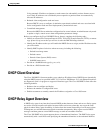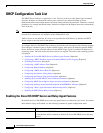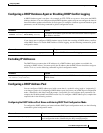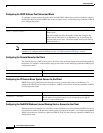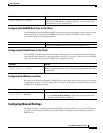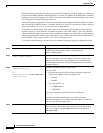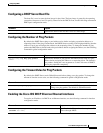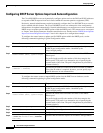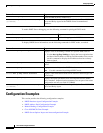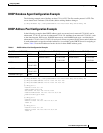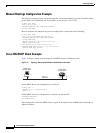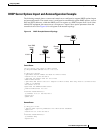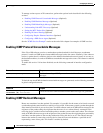
Configuring DHCP
Monitoring and Maintaining the DHCP Server
IPC-75
Cisco IOS IP Configuration Guide
Configuring the Relay Agent Information Option in BOOTREPLY Messages
To configure the DHCP Server to validate the relay agent information option in forwarded BOOTREPLY
messages, use the following command in global configuration mode:
Configuring a Relay Agent Information Reforwarding Policy
To configure a relay agent information reforwarding policy on the DHCP Server (what the DHCP Server
should do if a forwarded message already contains relay information), use the following command in
global configuration mode:
Enabling the DHCP Smart-Relay Feature
By default, the DHCP smart-relay feature is disabled. To enable the smart-relay functionality, use the
following command in global configuration mode:
Monitoring and Maintaining the DHCP Server
To clear DHCP Server variables, use the following commands in privileged EXEC mode, as needed:
Command Purpose
Router(config)# ip dhcp relay information check
Configures the DHCP Server to check that the relay agent
information option in forwarded BOOTREPLY messages is valid.
Command Purpose
Router(config)# ip dhcp relay information policy
{drop | keep |replace}
Determines the relay information reforwarding policy in a cable
modem termination system.
Command Purpose
Router(config)# ip dhcp smart-relay
Allows the DHCP relay agent to switch the gateway address
(giaddr field of a DHCP packet) to secondary addresses when
there is no DHCPOFFER message from a DHCP Server.
Command Purpose
Router# clear ip dhcp binding {address | *}
Deletes an automatic address binding from the DHCP database.
Specifying the address argument clears the automatic binding for a
specific (client) IP address, whereas specifying an asterisk (*) clears
all automatic bindings.
Router# clear ip dhcp conflict {address | *}
Clears an address conflict from the DHCP database. Specifying the
address argument clears the conflict for a specific IP address, whereas
specifying an asterisk (*) clears conflicts for all addresses.



